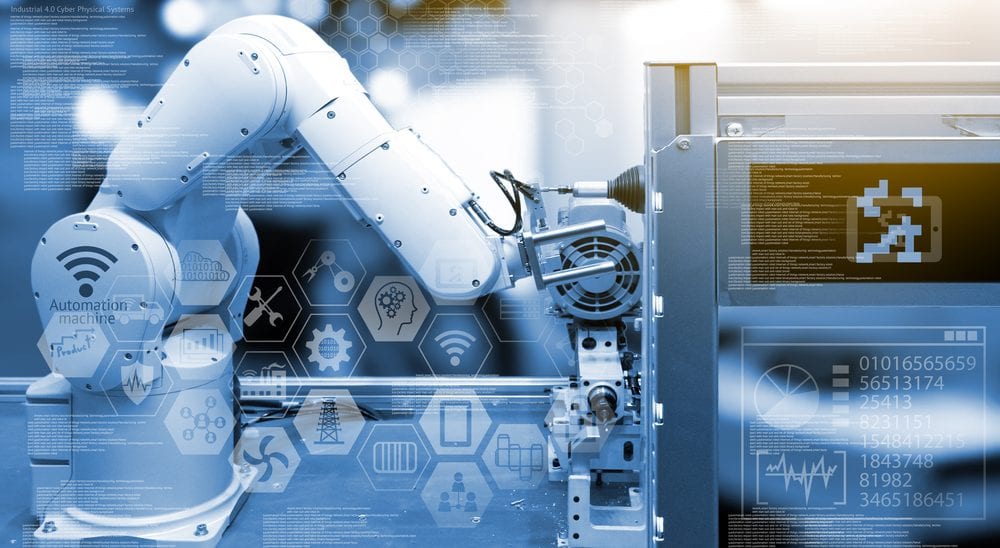Using Robotic Process Automation to Increase Job Productivity

Dr. John Bates, CEO of Eggplant elaborates on the benefits of Robotic Process Automation (RPA) when it comes to improving the workforce and company output.
We are currently undergoing the fourth industrial revolution (4IR), characterised by accelerated technological progress and new innovations that have immediate and lasting effects on society and the way we work. Artificial Intelligence (AI), robotics and other forms of smart automation have played a critical role in the automation technology and these technologies are predicted to contribute $15 trillion to global GDP by 2030 according to PwC. Increasingly, AI is providing assistance across organisations, utilised to provide companies with a competitive edge. AI and robotics technologies, such as RPA are automating previously manual and time-consuming tasks to free up people in nearly all departments such as HR, IT and marketing so employees can focus on solving complex problems and be more creative.
Unlike traditional workflow automation which originally required software developers to put in manual work upfront to automate actions, RPA technology allows companies to automate business processes – to activate specific keystrokes. This enables attended and unattended ‘bots’ to mimic selected tasks performed by a user within an organization such as data entry, processing it more quickly, efficiently, and with fewer errors. This technology is increasingly being deployed throughout the business world, in 2018 alone RPA software revenue grew by 63.1%. However, many companies are still hesitant to adopt and embrace the full capabilities of RPA.

Hurdles to AI and RPA adoption
Despite the competitive advantage that AI and RPA offer business in terms of time saving and efficiency many companies have yet to deploy this software internally. The main challenges to increasing adoption of AI in the workplace include implementation challenges and the cost associated with AI and RPA development. Moreover, challenges can often be categorized into structural and cultural pushback. Perhaps the most significant structural challenge is ensuring companies are choosing the right automation process – whether it is to scale, regulatory compliance or to improve customer experience, this needs to be established in order to maximize ROI and achieve specific company goals.
Cultural barriers also exist. Employees can often struggle to grapple with implications regarding what AI and RPA can and can’t do. People can often associate AI and RPA as robots invading the workspace, taking over their job and making their role obsolete. It is important to acknowledge these perceptions and address them head-on. Communicate that this technology will work with your employees not for them as many processes still require a high degree of human decision making and cannot be fully taken over. Businesses need to work internally to present this technology as an opportunity for existing employees to take on more mindful work that requires a human touch.
Read More: Where do humans fit into Industry 4.0?
Whilst, hurdles exist to the adoption of AI in the workplace, adopting this tech will enable companies to concentrate on less mundane tasks, whilst enhancing products and services, optimizing internal and external business operations, automating tasks to free up employees time to be more creative, capturing and applying knowledge as well as pursuing new markets. In crowded marketplaces where organizations are struggling to compete and grow, this value-add is an undeniably positive resource.
Reaping the benefits of RPA
RPA can be found in all industries. However, some industries which stand out include the financial and healthcare industries. RPA is easy to use and, contrary to common perceptions, it doesn’t require significant developer involvement and can be applied in all industries with repetitive and admin heavy tasks. Ultimately the tech frees up employees’ time and enables businesses to improve outcomes by reducing errors.
Where RPA can really make a difference is in the healthcare industry, by eliminating the administrative burden for employees, lessening data entry and reducing human errors. For instance, RPA is aiding clinical data extraction, as correct patient data is extracted from files and sent directly to employees who analyze and interpret findings from this data set. Additionally, small but necessary tasks such as scheduling patient appointments can be done automatically. This allows health institutions, such as the NHS, who are often under strain, especially during the current COVID-19 outbreak, to focus what matters most, treating and caring for patients.
While in the financial sector, RPA and AI can help to provide an amazing customer experience and a competitive advantage in an increasingly saturated market. Some advantages include AI bots processing everyday customer enquiries and automating mundane and rule-based processes, improving turnaround time and overall customer satisfaction .Using a rule-based approach, RPA can also speed up processes such as credit card applications by approving or rejecting applications based on rule-based data.
What the future holds
RPA continues to evolve, develop and attract investment. We are currently in a stage of disruption as new offerings, vendors and models are emerging rapidly. Making RPA smarter is the next step to maximising its capabilities. Combining RPA with AI will improve efficiency by enabling RPA to adjust its procedures without human intervention.
Additionally, for RPA to reach its full potential, companies need to ensure they are implementing it in the right places to achieve their goals. This then goes hand in hand with ensuring their employees are educated and fully behind the company’s digital transformation strategy. Companies facilitating automation, in order to automate those mundane and arbitrary tasks whilst improving job productivity, will ultimately improve overall performance and achieve a competitive advantage.